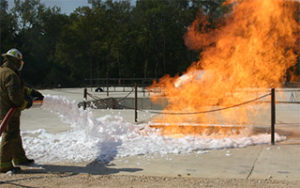What is AFFF and what are PFAS carcinogens?
Aqueous film forming foam is a fire suppressant agent which functions by cooling fire and coating fuel to create a film between fuel and oxygen and prevent further combustion (CRCCare).
Used for many years in the manufacturing of this agent are two compounds from the family of man-made chemicals called PFAS (per- and polyfluoroalkyl substances). These two compounds, perfluorooctane acid (PFOA) and perfluorooctanesulfonic acid (PFOS), can be found in AFFF and have been proven to share key chemical characteristics with known carcinogens. A study published by the International Journal of Environmental Research and Public Health found that “PFAS impact biological functions linked to an increased cancer risk.” From the American Association for the Advancement of Science, “Changes in the body, such as hormonal dysregulation and weakened immune system, increase cancer risk, and PFAS chemicals cause many such changes.” The U.S. Environmental Protection Agency says both PFOS and the PFOA replacement chemical GenX show evidence of carcinogenicity. According to the American Cancer Society, lab studies done on animals exposed to PFOA showed increased risk of tumors on the liver, testicles, mammary glands, and pancreas. Studies which have examined cancer rates in people living near or working in PFOA-related chemical plants have shown an increased risk of testicular cancer, and to a lesser extent kidney and thyroid cancer.
How do PFAS chemicals contribute to an increased cancer risk?
PFAS are nicknamed “forever chemicals” because they have long half-lives and build up over time in the bodies of those exposed. This buildup of concentrated PFAS/PFOA/PFOS in the body is linked to risk of thyroid disease and testicular, bladder, and kidney cancers. A proven health outcome from exposure to PFAS is immunotoxicity— quoting from a study by the Harvard Department of Public Health, “Five studies examined the association between PFAS exposure and suppression of antibody response to vaccination among children, adolescents or adults. Four out of the five found statistically significant associations between higher PFAS exposure and suppressed immune response.”
If you or a loved one have developed cancer and were exposed to AFFF at any time, you should contact our firm about the AFFF firefighting foam lawsuit.
